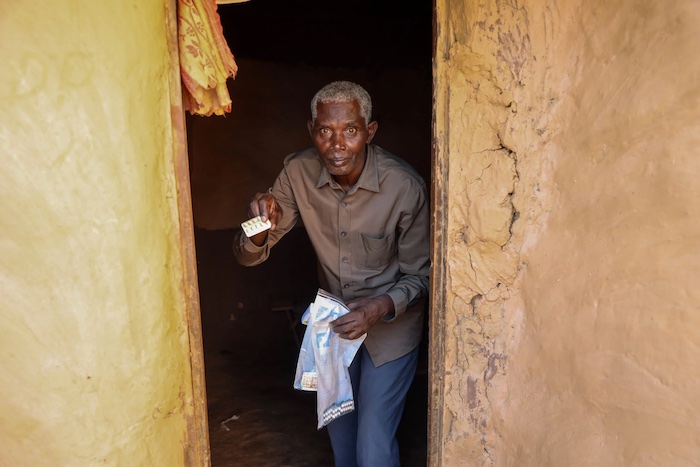
Obed, a Congolese refugee, is shown with his medications for heart disease. © UNHCR/ Eric Didier Karinganire
By Eric Didier Karinganire
It was a nightmare when, in mid-2021, Obed Nyirimigabo, now aged 67, started abruptly losing consciousness every so often. This was compounded by difficulties breathing, heightened weakness, severe dryness, loss of appetite, and sleep struggles.
“At first, I went to the health centre and they gave me some medicines, but the situation kept worsening,” Obed, a Congolese refugee who has been living in Kiziba camp since 2003, says. “Then, a frightening thought crossed my mind: this might be witchcraft.”
The father of nine also tried to take some traditional medicines, but unfortunately, they proved ineffective as well.
And his weight continued to diminish, dropping from 85 kilograms to 60 kilograms.
“One day, he collapsed and appeared to be dead, but he eventually regained consciousness,” recalls his wife, adding that the health center located in Kiziba camp subsequently decided to refer him to a more advanced hospital.
Around 1am, Obed was rushed to Kibuye referral hospital – approximately 16 kms from the Kiziba refugee camp.
After arriving at the hospital – which is at secondary healthcare level – Obed was rushed to a specialist in internal medicine.
“After undergoing several medical tests, including radiography and echocardiography, physicians informed me that I was suffering from heart disease,” Obed recounts. “I was hospitalized for one month, during which they took care of me and prescribed medication. They advised me that I must take the tablets for the rest of my life.”
Thanks to access to advanced healthcare, Obed was finally able to learn about what he was suffering from after seven months of what seemed like a mysterious disease. It also allayed his concerns about witchcraft and built his confidence in the health care system.
“My illness is now known and I get medical attention,” Obed says, adding that since then, he goes to the primary health centre in Kiziba refugee camp every month to pick up his prescription of tablets.
Obed is one of the refugees whose lives have been saved, thanks to a generous funding Eaglecom Foundation, a private foundation that provides funding for vital life necessities including medical care for people in need. With the funding, the UN Refugee Agency (UNHCR) was able to support refugees like him residing in Rwanda’s refugee camps to access healthcare in the second half of 2023. This included access to both medicines at camp-based health facilities free of charge and enabling UNHCR to cover the cost of refugee referrals to secondary and tertiary-level hospital care.
Overall funding has contributed towards the referrals of 3,342 refugees to hospitals in the last six months of 2023.
Despite the funding provided, however, UNHCR was only able to support emergency and lifesaving cases for referral with other elective cases being put on hold.
Obed says there has been a significant improvement in his health conditions since he started taking the medicines. His difficulties breathing have subsided and he has also regained weight, now at 74kg.
“After learning of my illness, I accepted the situation and began following the medical advice they provided,” he points out, adding that in addition to taking medicines regularly, health experts recommended him to eat organic foods including vegetables, fruits and wholegrains.
A lack of financial means to afford these healthy food items, however, remains a great challenge to Obed. With a large family of nine children, aged between six months and 20 years, to feed and take care of and a lack of work opportunities, life is getting more and more difficult.
And such a situation is likely to aggravate distress for vulnerable refugees like Obed, worsening their health conditions.
“They [medical doctors] advised me to avoid stress, but in a situation with many problems, it’s impossible for me to escape stress,” he says.
Despite the challenges, Obed expresses gratitude for the medical care he received, acknowledging that without it, he wouldn’t have survived.
In 2024, nearly $10 million is urgently needed to support the refugee health sector in Rwanda. [ Source : UNHCR Rwanda]. (End)
